Tucson COVID Tales No. 9: The Tucson Frontline Workers Portrait Project, by Kathleen Dreier
I am a portrait and event photographer in my 15th year of business in Tucson. When the Covid-19 pandemic began to impact Tucson in March 2020, in the span of one week, all of my scheduled photography assignments were canceled for the rest of the year.
After processing the shock of the pandemic and financial implications, I considered how to utilize my photography skills, social work background, and social media platforms to support and educate the Tucson community. Tucson Frontline Workers portrait services was born from the desire to provide a forum for our frontline workers to share with us in their own words their Covid-19 experiences.
All portraits were completed outside, strictly following social-distance guidelines. Each portrait and statement is posted on multiple social media pages to amplify the professionals’ experiences. To date, 85 frontline essential workers and first responders have been featured in this no-cost portrait series.
My intention to serve our frontline is based on my intrinsic understanding of the challenges all services-related workers face even during “normal” times, now greatly compounded by the pandemic. My hope is that all Tucsonans become aware of and compassionate to the plight of all of our heroic frontline workers and their families and exercise safe behavior such as wearing a mask and following social distancing guidelines.
The full project can be viewed on Facebook (https://www.facebook.com/Covid19TucsonFrontLineWorkers) and Instagram (@TucsonFrontlineWorkers)
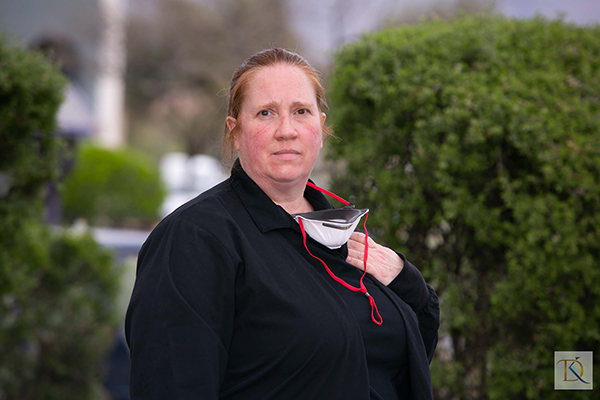
The mask that protects me from this virus is as suffocating as my fear of the virus. I feel isolated even as I am out in the world and doing my normal routine. Those of us who are “essential workers” are weary and afraid. Our emotional labor has increased greatly because people are so tense and scared. We have to act like everything is normal, offering calmness and confidence even as we monitor every single cough and ache for signs of COVID-19. Most of my family and friends are self-quarantining, which makes me feel separated from the collective experience. While I am happy I live alone, so I don’t risk infecting others, the isolation adds to my stress. Part of me is so grateful for my job, my co-workers, and my health, and another part of me wants to hide at home from everything that is happening. But like many others, I find the strength to keep up and do my job so others can get the help they need.
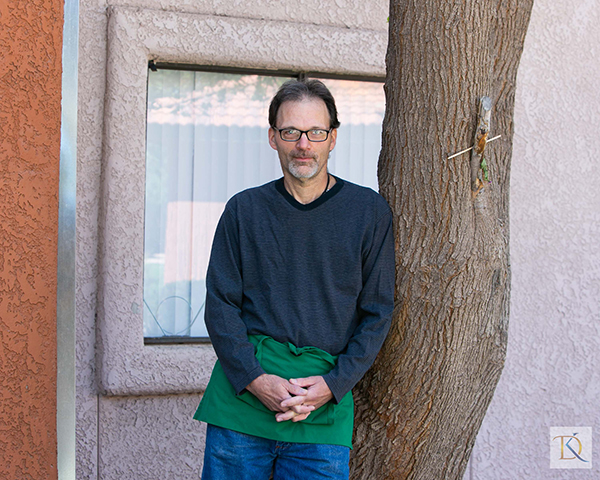
When the panic first started and people began stocking up, I was excited about the major increase in sales our store was having. Sales easily doubled and almost tripled in a very short time. Within a few days, as I watched my shelves get completely emptied of paper, rice, beans, and water, my excitement turned to anxiety. I have to get those shelves refilled so that people can eat. Supply and transportation issues that are completely out of my control made that very difficult. I felt like I was letting my customers down. I feared that I could be fired. I know the importance of my job in the food supply chain and how much comfort just having food in our pantry can bring during a crisis. I was not doing the job as I strive to do all the time.
As the initial surge of shopping calmed down, our company was already doing lots to protect the health of the employees and of our customers. Now the impact of the health side of this crisis on me, my co-workers, and my customers has come more into my focus. Before social distancing, how many people could have infected me and how many people could I have then infected? Will or when will the other shoe drop? When will grocery workers, frontline essential employees, start getting sick—me, my co-workers, my friends?
I love doing my job. I enjoy my co-workers, their humor and good spirits. Customers are generally understanding, kind, and appreciative. I’m so very thankful that my job is still here and that my company is doing so much to take care of us. Right now though, I am unsure of everything. My world is unbalanced.
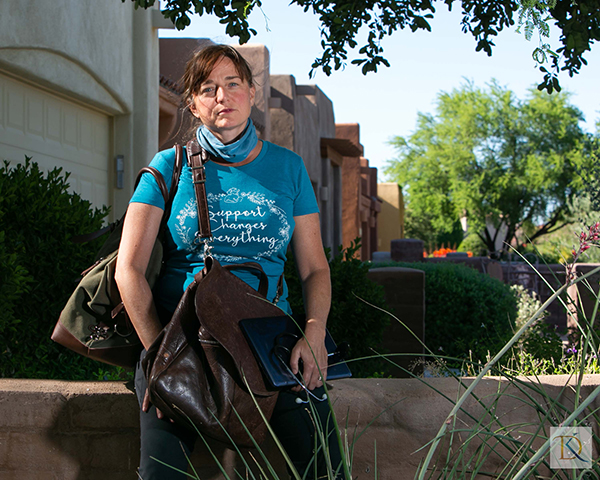
I am a nurse-midwife in Tucson Arizona. This is me coming home from work in the morning.
Life during the pandemic is different, both good and bad. Tolerance of uncertainty is an essential skill, and something midwives are used to.
What worries me most are my clients who are socially vulnerable, living in unsafe situations, or in homes full of violence and addiction. I worry about the children. Families have suffered from social isolation, quarantine, and separation. I worry about the life-course health consequences of worsening poverty.
The same social injustices that existed before COVID are only magnified by this disease. Egregious health disparities plaguing our women and children are only getting worse during the pandemic.
These are the tools and rituals in my saddle bag that I rely on during COVID:
My fetoscope. COVID-19 has required many communities to get back to the basics for childbearing families to preserve hospitals for sick people. Avoiding the use of electronic fetal monitors for normal, healthy, childbearing moms is an important way to keep moms and babies safe. It is becoming a lost art. When COVID hit New York City hard, I was involved in helping to promote national guidelines for teams that have not been trained or supported in the art and science of “listening.” This fetoscope was given to me by my mentor and is a symbol of midwifery and family centered care; especially important during the pandemic.
My computer. COVID has required that we organize our care delivery differently for the safety of the community and each other. This means I use my computer more than ever. In my 20 years of being a midwife, our workflow has changed tremendously. The word “midwife” means “with woman.” I sometimes feel like I am “with computer.”
The electronic health record is an important part of quality and safety. It is also a driving force of burnout in our field. I bring my own computer to and from work, because sometimes I need to work on several workstations at once to keep up with the charting. On the bright side, telehealth has taken off during COVID! Be with a provider in the comfort of your own home, when you want it, in your natural habitat. I hope we keep this option going!
My street clothes. When I am not working clinically, I practice strict social distancing. I wear a mask in public at all times. We don’t wear our scrubs to or from the hospital. When we get home, our street clothes go straight to the wash and we go to the shower. My shirt says “Support Matters.” It comes from La Leche League. We know that the support provided by the healthcare team matters. Nurses, medical assistants, doulas, lactation consultants, social workers, behavioral health, physicians, and midwives matter. Our team has united to support families and each other during the pandemic and I am proud.
My sleeping bag. Midwives are no stranger to long nights. We have changed our call schedule to limit the number of midwives who are exposed to COVID. If I nap, I sleep in my own sleeping bag and wash it immediately when I walk through the garage door. We are all vulnerable. No one is immune.
Healthy midwives have died across the world over the past eight weeks. We are scared.
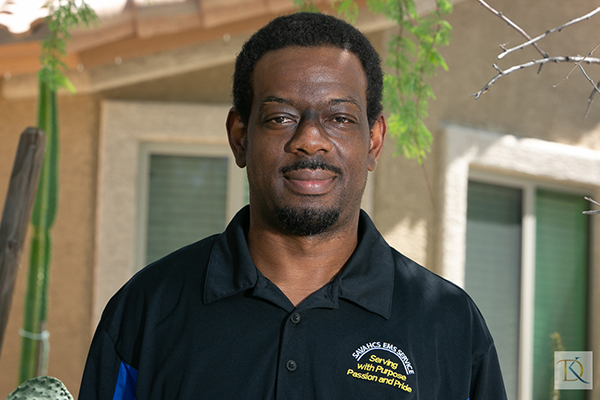
This whole notion of being a housekeeper and considered a “frontLine worker” is fairly surreal to me. I say that because I served in the Iraq War on the front lines. At that point in time I was a frontline worker. While I understand the terminology, I didn’t really grasp the magnitude of the current title I was given until I was assigned to the COVID-19 ward. I was officially at Ground Zero, back in the war zone. I was right in the thick of what the entire country was grappling with. I have a front-row seat to the devastation, the brutality, and the raw carnage of a disease that many people did not, and some still don’t, believe is a real thing. It only took one shift to change my mind.
As I make my daily rounds of cleaning, trash collecting, sweeping, and mopping, I am required to enter rooms where life and death are engaged in a tug of war, with the balance of power tipped toward death. However, I also get to witness angels in protective gloves and gowns provide some of the most intensive and critical care one can imagine in order to give the patients a fighting chance.
The work that I perform is dangerous, yet critical. It is thankless, yet rewarding. It is repetitive, yet vital. And most important, it is never-ending, yet it is “essential.”
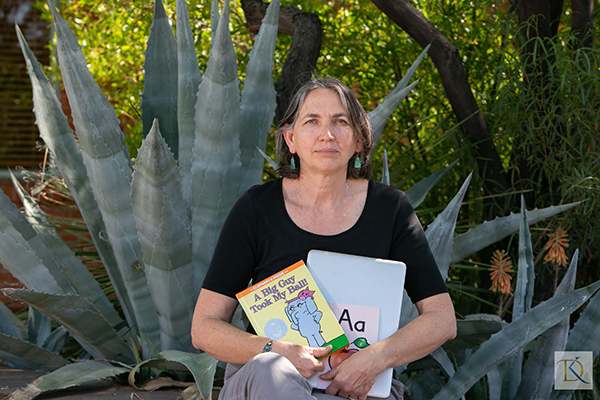
I am a 1st grade teacher who works with a high population of English language learners.
It felt like a sucker punch when I heard schools were going to close, thinking about how much learning, growth, and community students would be missing out on.
The big questions that came into my mind were: How can I provide access to learning to students who do not have technology in their homes? What are the most fundamental concepts I should be focusing on with such limited student contact time? How will I maintain a sense of community with my class? The answers are that all these have been and continue to be a challenge.
What has been inspiring is to see parents, with all they have to juggle, working so hard to ensure their children move forward with their learning. I feel that many parents and I have become educational partners in a deeper way than I have experienced before in my 20+ years of teaching.
What has been uplifting is seeing my students’ bright faces on my computer screen, watching them continue to interact as a community and grow as learners. Doing reading tutoring over the phone with students who don’t have internet, but are still able to share the joy of a good story together. And celebrating with our whole class, doing a drawing project with our art teacher, that ended with proud faces holding up their finished products.
Students and families have had to make significant sacrifices, as all of us have, in order for our community to move forward safely. It may take considerably more time and sacrifice, but my hope is our community remains diligent, keeping ourselves and each other safe.
Visit Kathleen Dreier at www.kathleendreier.com.
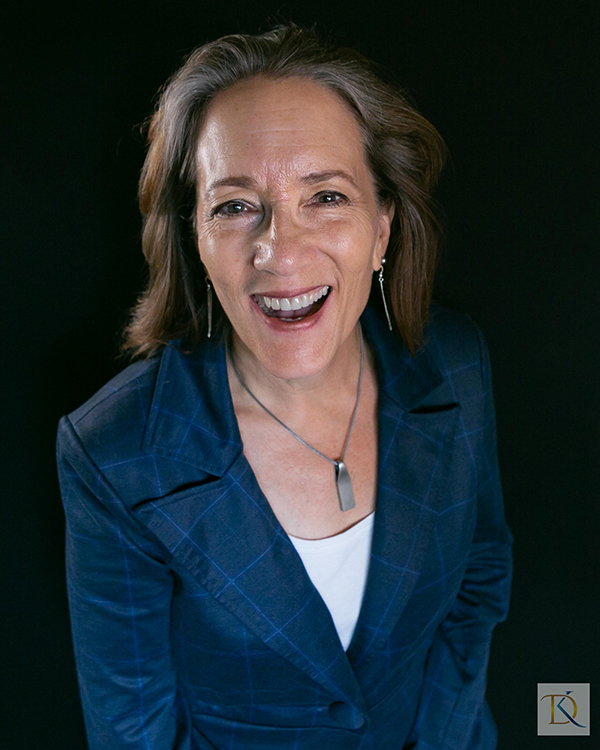
Category: TUCSON COVID TALES




